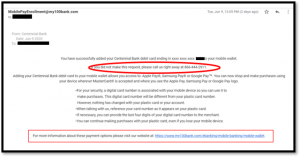
by Laurie Osgood | Jul 16, 2020

Lately, scammers have gotten more sophisticated. So it’s worth reminding everyone that if you receive an unsolicited email, text, or phone call, DO NOT give out any of your personal information! Scammers often update their tactics, using any way they can to trick you into handing over your precious personal information.
Earlier this week, I received an email (see below) telling me I had successfully set up a mobile wallet using my bank account. Since I had not signed up for this service, I was tempted to call the phone number listed in the email to dispute it. I hesitated, and for good reason. If I had contacted them, they would have tried to get my personal identification information, and then used that information to steal my identity or bank funds. I called my bank directly and learned this scam was recently perpetrated against 40,000 debit card users.
Phishing emails and text messages often appear to be legitimate and from a company you know or trust (like my own bank). These phishing emails and text messages often describe a problem with your billing, to trick you into clicking on a link or an attachment.
REMEMBER, if you receive this kind of message, by email or text, do not click on any attachments or call the phone number that is listed.
The Federal Trade Commission’s (FTC) Consumer Information page offers these tips for consumers to recognize and avoid phishing scams. View their website for more information. https://www.consumer.ftc.gov/topics/privacy-identity-online-security.
- Protect your computer by using security software.
- Protect your mobile phone by setting software to update automatically
- Protect your accounts by using multi-factor authentication
- Protect your data by backing it up
Lesson learned? Protect yourself and don’t believe anything that doesn’t feel right!

For more information about protecting yourself and your finances, contact your local UF/IFAS Extension Agent.
Extension classes are open to everyone regardless of race, creed, color, religion, age, disability, sex, sexual orientation, marital status, national origin, political opinions or affiliations.

by Laurie Osgood | Jun 15, 2020

Photo Source: Laurie Osgood
With everything going on in the world today, it could be easy to forget one of the most important holidays of the year, Father’s Day. We will celebrate Father’s Day on June 21st this year, during Men’s Health Month! Father’s Day is a good time to show the men in our lives that we want them to be with us for a long time. Let’s celebrate Men’s Health Month by encouraging the men in our lives to adopt healthy habits and seek regular medical advice.
Most men do not like to go the doctor. A 2014 survey conducted by The Centers for Disease Control (CDC) determined that American men are much less likely to go to the doctor than women. Starting a conversation could encourage him to pay attention to his health as he ages. But how do we start the conversation with our father’s about their health issues? To ensure a stress-free conversation, pick a time and place with few distractions and present the topic in a loving and non-judgmental manner.
Here Are the Top Healthy Living Tips for Men:
- Schedule an annual physical exam: Annual physical exams can help spot potential problems before they get serious. Only you and your doctor can determine your best checkup and screening schedule. Preventative screenings such as an annual colonoscopy are based on a patient’s age and risk factors for developing a condition or disease, including family or personal history, age, ethnicity, and environmental exposure.
- Recognize the Signs and Symptoms of a Heart Attack: According to the American Heart Association, someone in the U.S. has a heart attack every 40 seconds. Therefore it is important for everyone to recognize the signs of a heart attack. These warning signs include pain or discomfort in the jaw, chest, arms, shoulders, neck, or back, feeling light-headed or weak and shortness of breath.
- Make sleep a priority: Many adults don’t get enough sleep. Sleep is essential for our bodies to maintain our healthy bodily functions. Sleep disorders and ongoing lack of sleep can increase the risk of heart disease, high blood pressure, stroke, and diabetes.
- Reduce Stress: High levels of stress can negatively affect a man’s lifestyle. Stress can be life threatening and can lead to a heart attack. UF/IFAS Extension’s Electronic Data Information Source (EDIS) offers a collection of information on various subjects including how to manage stress.
- Stop Smoking: Men who smoke are at a greater risk for heart disease, cancer, respiratory diseases and strokes. Quitting can help lower the risk for smoking-related illnesses. The Florida Department of Health’s Tobacco Free Florida campaign offers resources to help quit tobacco use.
- Exercise More: Regular workouts can improve heart health as well as reduce stress and weight. Experts tell us that we should all try to get at least 30 minutes of moderate physical activity each day to maintain a healthy lifestyle.
- Eat Healthy: A healthy diet should include a variety of fruits and vegetables, whole grains, lean meats, and low-fat dairy products daily. USDA offers tips for Men’s Health; 10 Tips: Get the Facts to Feel and Look Better .
Father’s Day is a great time to celebrate the men in our lives and encourage them to pay attention to their health and well-being because we want them to be around for a long time.
Going to the doctor may not be as fun as going to a ballgame or the beach, but having a conversation about their health may be the gift we can give our fathers on Father’s Day.
For more information on healthy living or other extension related topics, contact your local UF/IFAS Extension Agent.
Extension classes are open to everyone regardless of race, creed, color, religion, age, disability, sex, sexual orientation, marital status, national origin, political opinions or affiliations.

by Laurie Osgood | Mar 26, 2020

The goal of National Healthcare Decision Day is to inspire Americans to communicate their end-of-life wishes about healthcare with their families and healthcare providers.
Although making healthcare decisions is often a difficult process, making decisions for others is even more complicated.
According to the 2018 Conversation Project national survey, Americans are becoming more comfortable talking to their loved ones about their end of life wishes. Over half (53%) of Americans say they would feel relieved if a loved one started “the Conversation.”

Start the family “conversation”
Photo Source: Laurie Osgood
Once you have initiated the conversation, experts recommend creating an advance care directive. Advance care directives are legal documents that are used to secure your decisions about end-of-life care, to avoid confusion and uncertainty later on. These legal documents can include a living will, health care proxy, health care power of attorney or instruction directive. Having an advance care directive in place will help make sure that your wishes about your health care are fulfilled, even if you are no longer able to communicate your wishes.
Don’t wait for “the right time” to talk with your family, everyone should plan for their future, before a crisis arises.
There are many tools and online resources that can help you and your family begin this important conversation.
To learn more about National Healthcare Decision Day and advance care directives. Visit NHDD.org.

by Laurie Osgood | Mar 3, 2020
Friendships are an important part of life, and friendships can have a tremendous impact on our personal well-being and overall mental and physical health. Social isolation can lead to depression and loneliness. The relationships that we build with our family and friends can affect the quality of the friendships that we develop over our lifetimes. Some people thrive socially and develop deep, meaningful connections with others, while others only maintain distant friendships. However, it is important for us to help our children learn to develop these important social skills. Researchers have long documented links between the quality of relationships between family members and their relationships with their peers. Participation in team sports can have lasting benefits, including responsible social behaviors, good sportsmanship, strong leadership skills, academic success, and self-confidence.

Parents can form lasting friendships while supporting their kids in youth sports. (Photo source: Laurie Osgood, UF/IFAS Extension)
When It Comes to Youth Sports, Parents Don’t Always Behave Themselves.
As team sports become more competitive, there is increased attention placed on the negative aspects of team sports, mainly parental expectations and behavior. Having spent a large part of my life sitting in the stands watching my children play team sports, I have developed deep, long-lasting friendships with the parents of my children’s friends. These friendships are often maintained between parents long after our children put away their soccer cleats. Of course, overbearing parents can take the fun out of sports for our children. Many children drop out of team sports because they are no longer having fun and participation becomes too stressful.
What Can Parents Do to Help Their Kids Develop Positive, Warm Friendships?
- Continue to nurture and support the friendships that you have established throughout your lifetime.
- Be a good sports parent by showing support to your child.
- Model good friendship skills. This will help youth understand social competence.
- Be happy and have fun at your child’s competitions.
- Minimize pressure & don’t coach your child from the sidelines.
- Nurture the youth’s ambitions, but don’t let them get too wrapped up in the competitiveness.
- Be respectful of your child’s teammates, coach, opponents, and the game’s rules and traditions.
It is our job as parents to teach our children social skills to help them grow as individuals, not just athletes. As parents it is our job to nurture their emotional and physical development. Even as adults we must continue to stay connected with our friends and families. As we grow older, good friendships can prevent loneliness, improve our health, boost our well-being, and even add years to our lives.

by Laurie Osgood | Nov 25, 2019

Photo credit: UF/IFAS NW District
Rice and pasta are a staple of most family meals. But did you know these simple grains can lead to a foodborne illness? Uncooked rice and pasta can contain spores of Bacillus cereus, a bacterium that can cause foodborne illness. These spores can survive even when rice or pasta is cooked. If the rice or pasta is left standing at room temperature, like in a pot on the stove, these spores can grow into bacteria. These bacteria will then multiply and produce toxins (poisons) that can cause foodborne illness. Bacillus cereus, sometimes called B. cereus, can cause nausea, vomiting, and abdominal cramps.
Preventing Contamination by B. Cereus
Because B. cereus endospores are heat resistant, they are likely to survive cooking at temperatures that would destroy other foodborne pathogens. Bacillus cereus spores can grow when exposed to heat or improper handling.
Recommendations for Proper Handling of Rice and Pasta:
- Cook rice and pasta at 135ºF or above and maintain at that temperature outside of the refrigerator.
Serve rice or pasta as soon as it is cooked.
- Cool in the refrigerator at 41ºF or below within 2 hours of cooking.
- Store rice or pasta in the fridge using a shallow container or resealable bags.
- Cooked rice or pasta can be stored in airtight containers in the fridge for 3 – 5 days.
- Do not reheat rice or pasta more than once.
During the holidays, celebrations usually center around family and good food, and, therefore, our refrigerators easily can become full. We tend to leave rice or pasta out on the stove when there isn’t any room in the fridge. This is where the problem occurs. By following proper food handling techniques, you can ensure that everyone enjoys the holidays and the fabulous foods that are part of the festivities.
To learn more about Bacillus cereus or other foodborne illnesses, contact your UF/IFAS County Extension Office.
Resources:
UF/IFAS Electronic Data Information Source (EDIS), Preventing Foodborne Illness: Bacillus cereus
The Number of Food Poisoning Cases Caused by Bacillus cereus is on the Rise. (2015, April 1). Infection Control Today. Retrieved from https://www.infectioncontroltoday.com/food-safety/number-food-poisoning-cases-caused-bacillus-cereus-rise












